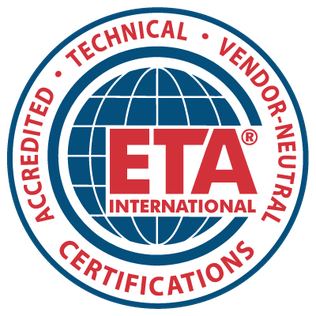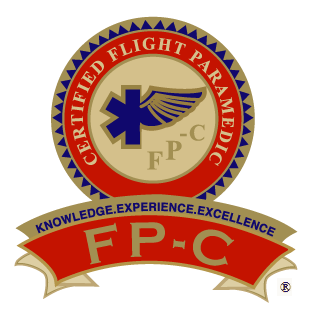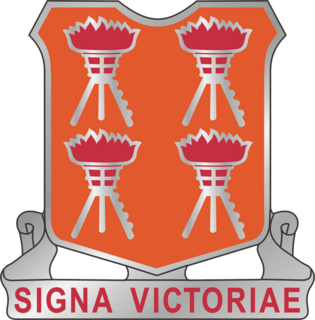Related Research Articles
Professional certification, trade certification, or professional designation, often called simply certification or qualification, is a designation earned by a person to assure qualification to perform a job or task. Not all certifications that use post-nominal letters are an acknowledgement of educational achievement, or an agency appointed to safeguard the public interest.
Cisco Certifications are the list of the Certifications offered by Cisco Systems. There are four or five levels of certification: Entry (CCENT), Associate (CCNA/CCDA), Professional (CCNP/CCDP), Expert (CCIE/CCDE) and recently Architect, as well as nine different paths for the specific technical field; Routing & Switching, Design, Industrial Network, Network Security, Service Provider, Service Provider Operations, Storage Networking, Voice, Datacenter and Wireless.
There are also a number of the specialist technician, sales, Business, data center certifications, CCAI certified instructor.
The Oracle Certification Program certifies candidates on skills and knowledge related to Oracle products and technologies.
Certified Ethical Hacker (CEH) is a qualification obtained by demonstrating knowledge of assessing the security of computer systems by looking for weaknesses and vulnerabilities in target systems, using the same knowledge and tools as a malicious hacker, but in a lawful and legitimate manner to assess the security posture of a target system. This knowledge is assessed by answering multiple choice questions regarding various ethical hacking techniques and tools. The code for the C|EH exam is 312-50. This certification has now been made a baseline with a progression to the C|EH (Practical), launched in March 2018, a test of penetration testing skills in a lab environment where the candidate must demonstrate the ability to apply techniques and use penetration testing tools to compromise various simulated systems within a virtual environment.

The Electronics Technicians Association, International is a US-based not-for-profit 501(c) 6 professional association founded in 1978. The association provides certifications in industries such as basic electronics, fiber optics and data cabling, renewable energy, information technology, photonics and precision optics, customer service, biomedical, avionics, wireless communications, radar, and smart home. ETA is also one of the 13 COLEMs for U.S. Federal Communications Commission (FCC) testing. ETA works with technicians, educators, and military personnel. ETA also partners with companies such as Motorola Solutions to provide certification to their employees.
The International Software Testing Qualifications Board (ISTQB) is a software testing certification board that operates internationally. Founded in Edinburgh in November 2002, the ISTQB is a non-profit association legally registered in Belgium.

The Flight Paramedic Certification (FP-C) is an advanced certification that indicates an individual has attained the designation of Certified Flight Paramedic. The FP-C certification exam is administered by the International Board of Specialty Certification (IBSC), a not-for-profit organization responsible for the administration and development of specialty certification exams for critical care professionals. The FP-C exam was the first specialty paramedic certification offered by the BCCTPC in 2000. This certification is designed for experienced paramedics who have demonstrated advanced knowledge of critical care medicine.
The following outline is provided as an overview of and topical guide to information technology:
The Convergence Technologies Professional certification program, now known as CompTIA CTP+, was designed to ensure that all convergence workers have a proper foundation for using the technologies associated with Voice over IP. Individuals can take the CTP+ exam to demonstrate their knowledge of technologies and best practices including codecs, network planning, troubleshooting, and providing quality video and voice over data networks. The certification was retired in 2012.
An Adobe Certified Expert (ACE) is a person who has demonstrated proficiency with Adobe Systems software products by passing one or more product-specific proficiency exams set by Adobe.
Professional certifications in computer technology are non-degree awards made to those who have achieved qualifications specified by a certifying authority. Depending on the particular certification, qualifications may include completing a course of study, proof of professional accomplishments, achieving a specified grade on an examination. The intention is to establish that an individual holding a certification is technically qualified to hold certain types of position within the field.
Apple certification programs are IT professional certifications for Apple Inc. products. They are designed to create a high level of technical proficiency among Macintosh service technicians, help desk support, technical support, system administrators, and professional users. Apple certification exams are offered at Prometric testing centers and Apple Authorized Training Centers, as well as online through Pearson Vue.
The Certified Wireless Network Administrator (CWNA) is a foundation level certification from the CWNP that measures the ability to administer any wireless LAN. A wide range of topics focusing on the 802.11 wireless LAN technology are covered in the coursework and exam, which is vendor neutral.
The Certified Wireless Network Expert (CWNE) is the highest level certification in the CWNP program started in 2001 by Planet3 Wireless. It certifies the ability to design, install, secure, optimize and troubleshoot IEEE 802.11 wireless networks.

Information Technology Specialist or Information Systems Operator-Analyst is a Military Occupational Specialty (MOS) in the United States Army. Information Technology Specialists have the responsibility of maintaining, processing and troubleshooting military computer systems and operations.

The Cisco Certified Internetwork Expert, or CCIE, is a technical certification offered by Cisco Systems. The Cisco Certified Internetwork Expert (CCIE) and Cisco Certified Design Expert (CCDE) certifications were established to assist the industry in distinguishing the top echelon of internetworking experts worldwide and to assess Expert-level infrastructure network design skills worldwide. These certifications are generally accepted worldwide as the most prestigious networking certifications in the industry. The CCIE and CCDE community has established a reputation of leading the networking industry in deep technical networking knowledge and are deployed into the most technically challenging network assignments. The Expert-level certification program continually updates and revises its testing tools and methodologies to ensure and maintain program quality, relevance and value. Through a rigorous written exam and a performance-based lab exam, these expert-level certification programs set the standard for internetworking expertise.
The Computing Technology Industry Association (CompTIA), is a non-profit trade association, issuing professional certifications for the information technology (IT) industry. It is considered as one of the IT industry's top trade associations. Based in Downers Grove, Illinois, CompTIA issues vendor-neutral professional certifications in over 120 countries. The organization releases over 50 industry studies annually to track industry trends and changes. Over 2.2 million people have earned CompTIA certifications since the association was established.
HP Networking offers trainings, typically delivered in HP Authorized Trainings Centers (ATCs) by HP Certified Instructors (HPCI).

Cyberoam Technologies, a Sophos Company, is a global Network Security appliances provider, with presence in more than 125 countries. The company offers User Identity-based network security in its Firewalls/ Unified Threat Management appliances, allowing visibility and granular control into users' activities in business networks. For SOHO, SMB and large enterprise networks, this ensures security built around the network user for protection against APTs, insider threats, malware, hacker, and other sophisticated network attacks.
The Microsoft Certified Professional or MCP Program is the certification program from Microsoft that enables IT Professionals and Developers to validate their technical expertise through rigorous, industry-proven, and industry-recognized exams. The certification exams offered cover a broad range of technologies throughout the Microsoft ecosystem of IT technologies. When an individual passes a certification exam and earns a Microsoft certification, then they are recognized as a Microsoft Certified Professional (MCP). By passing multiple exams they have the opportunity to earn larger, more distinguished certifications; such as the MCSE and MCSD certifications.
References
- ↑ "Nortel Training and Certification" . Retrieved 2012-02-07.
- ↑ "Nortel Training and Certification Retired Exams" . Retrieved 2012-02-07.
- ↑ "Nortel Certified Technology Specialist Designation" . Retrieved 2012-02-07.
- ↑ "Nortel Certified Support Specialist Designation" . Retrieved 2012-02-07.
- ↑ "Nortel Certified Design Specialist Designation" . Retrieved 2012-02-07.
- ↑ "Nortel Certified Technology Expert Designation" . Retrieved 2012-02-07.
- ↑ "Nortel Certified Support Expert Designation" . Retrieved 2012-02-07.
- ↑ "Nortel Certified Design Expert Designation" . Retrieved 2012-02-07.
- ↑ "Nortel Certified Architect Designation" . Retrieved 2012-02-07.